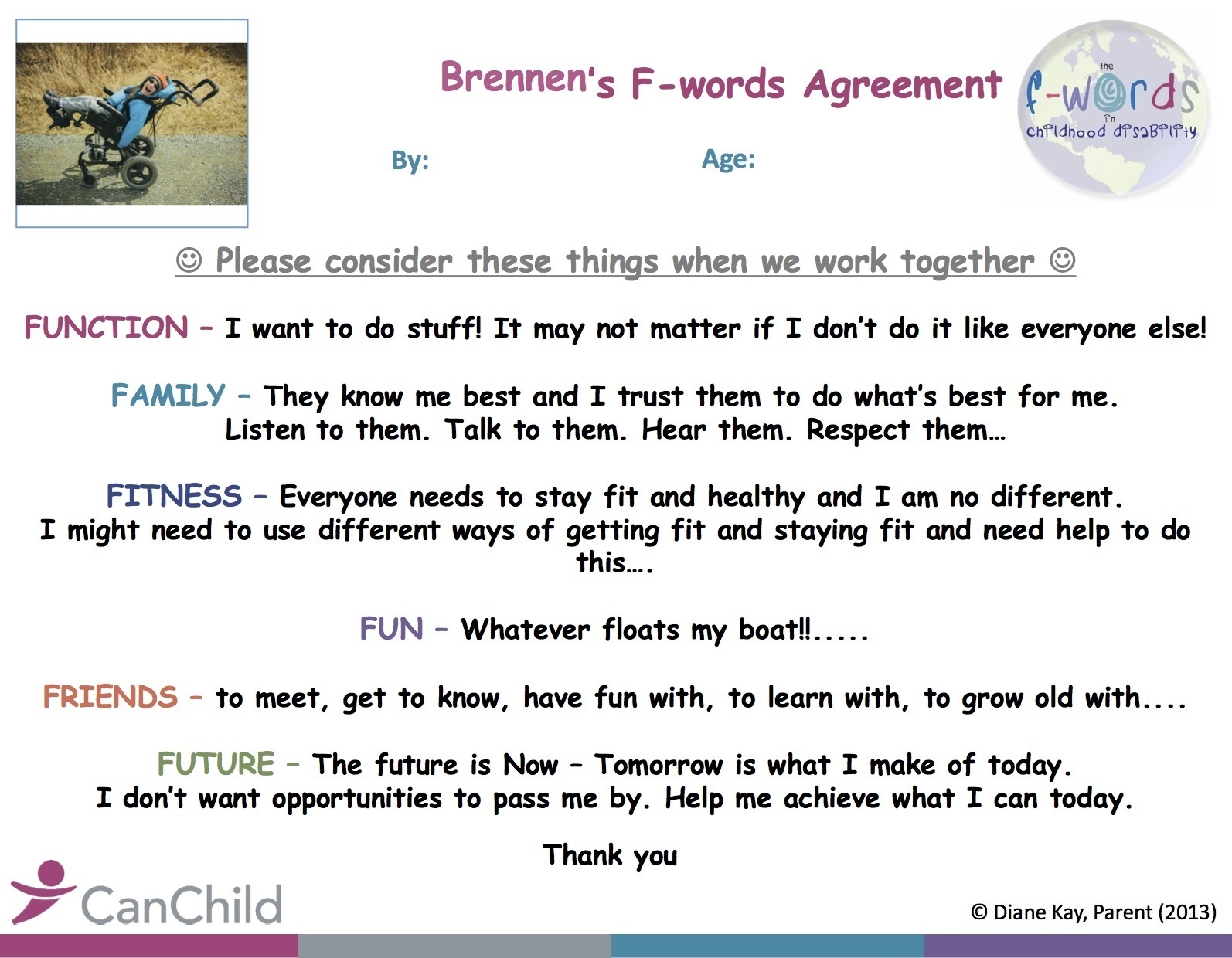
There is so much talk about self-care in the online caregiving discourse that it's just plain exhausting. What we need is a simple and realistic way to think about how to meet our own physical and emotional needs while we give care to another. I think I found a good one and it's called The F-Words in Childhood Disability.
I first learned about the F-Words when I heard about an article that my friends Dr. Peter Rosenbaum and Dr. Jan Willem Gorter wrote for a medical journal. The F-Words are: FUNCTION, FAMILY, FITNESS, FUN, FRIENDS AND FUTURE. The F-words build upon the World Health Organization's (WHO's) International Classification of Functioning, Disability and Health (ICF) framework. The ICF framework shows how body structure and function, activity, participation and environmental factors and personal factors are interrelated and equally influence our health and functioning.
These domains are key ingredients for the health of any child growing up with a disability but I began to think about how we could use this framework for anyone giving or receiving care.
Here's how a young man called Brennan filled in his F-Words template:

Now imagine how your loved one would fill in his or her F-Words template. Try it with them by downloading a template HERE. Even if your loved one is non-speaking or very incapacitated by illness or disability, they will have goals based on their 'best day' that you could fill in for them.
Now complete one for yourself. Given the givens, what can you realistically hope for in your own Function, Family, Fitness, Fun, Friends and Future? What are activities or goals that you could add into these domains? Use this template to think about balance in your caregiving life and share it with your loved one, your extended family, friends and even the medical professionals who support you.
Ask yourself how your loved one's F-Word goals mesh with your own. Can you negotiate or use these goals to help create a schedule of activities that reflect your best effort at balance?
For more information on the F-Words, check out the range of free tools and resources on the CanChild website HERE.
3 comments:
This is wonderful! Donna, I would love for you to be on our podcast, "Who Lives Like This?!" Please email me when you have a chance to discuss! [email protected]
Perfect topic, Donna. The needs of caregiving are a hot topic, obviously. Caregiving for people with dementia can be challenging and stressful. With that in mind, an important research project will soon be underway to increase the emotional and physical wellbeing of caregivers for people with Alzheimer’s and other dementias. The National Institute on Aging funds this research and you may be eligible to participate at absolutely no cost. Silicon Valley technology company People Power and researchers at the University of California Berkeley have developed a system designed to improve the safety of persons with dementia and mild cognitive impairment, and to reduce the social isolation of their caregivers.
Presence Caregiver learns daily activity patterns and can warn caregivers, family members and friends about incidents of concern with text alerts of potential hazards including falls, water leaks and wandering. The system is designed to work without making significant demands on a caregivers’ time and energy, and doesn’t use video cameras to preserve privacy.
The program is expected to open in 2-weeks (by mid March), but you can leave your email contact information to be among the first to participate in this important program -- and, again, it's absolutely free. Please visit
The Presence Caregiver Research Pack includes a variety of sensors that are installed in the home, similar to a security system, but without cameras. The sensors gather continuous pattern motion data and, using Artificial Intelligence (AI), create a safety net for the home that alerts caregivers to potential hazards. Data from sensors fuel a menu of helpful services that perform continuous monitoring of occupants. The easy-to-use app connects to and integrates with the wirelessly connected sensors to help understand the real-time and historic activities in the home, distributes alerts, connects with a Trusted Circle of family and friends, and more.
The Presence Caregiver Research Pack provides a variety of helpful caregiving services:
Receive mobile alerts if something appears to be wrong
• Know if someone wandered away from home
• Know if they have likely experienced a fall
• Know if their bathroom visit frequency changes
Track the current activities of occupants
• Know if and when the front door opened
• Know which room in the home an occupant visited
• Know when medication was accessed
Better understand rest and sleep patterns
• Know what time they went to bed and got up
• Know if someone leaves the bedroom at night
• Track sleep history and quality for improved health insights
Enable support from family and friends
• Add specific people to receive alerts
• Create and delegate helpful tasks to others
• Coordinate family and friends to stay in contact
Improve safety at home
• Call for help with the wirelessly connected button
• Help prevent falls at night with nightlights
• Know immediately of a water leak or clogged toilet
Enjoy voice control services with Amazon Echo
• Easily request helpful reminders to take medications
• Make phone calls, check weather, and play music
• Get answers to more than 100 million unique questions
Join and participate in a caregiving community
• Connect with and receive online advice from caregivers
• Access useful online content, resources and more
• Coordinate in-person meetings with fellow caregivers
The program is supported by the National Institutes of Health’s National Institute on Aging through a Small Business Innovation Research grant, #R44 AG059458-01
https://research.presencefamily.com
An excellent post! Thank you for sharing.
Post a Comment